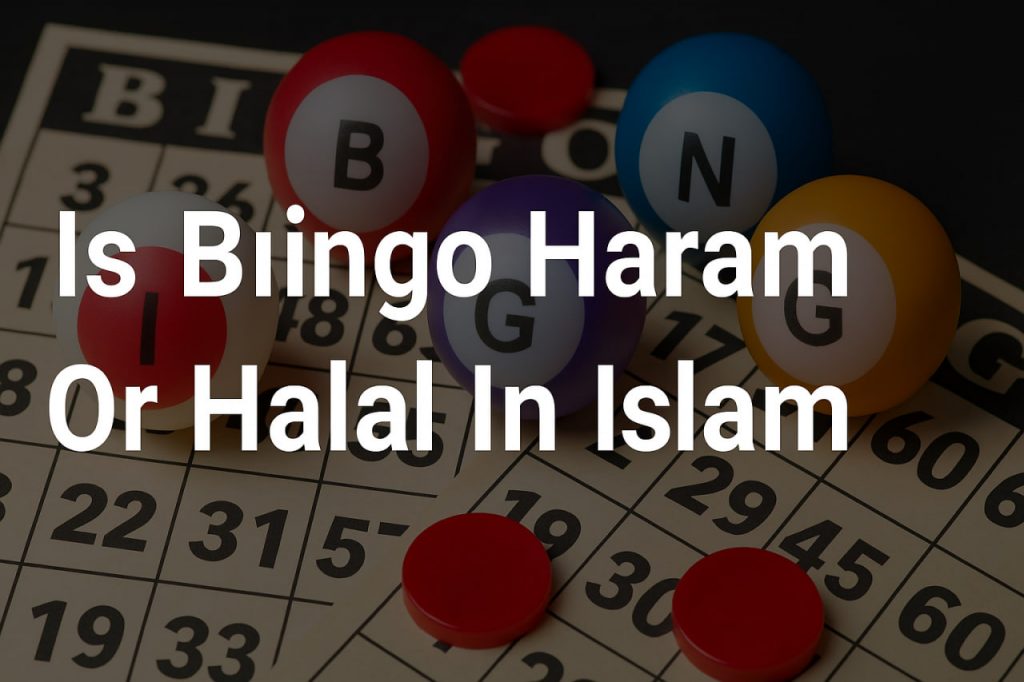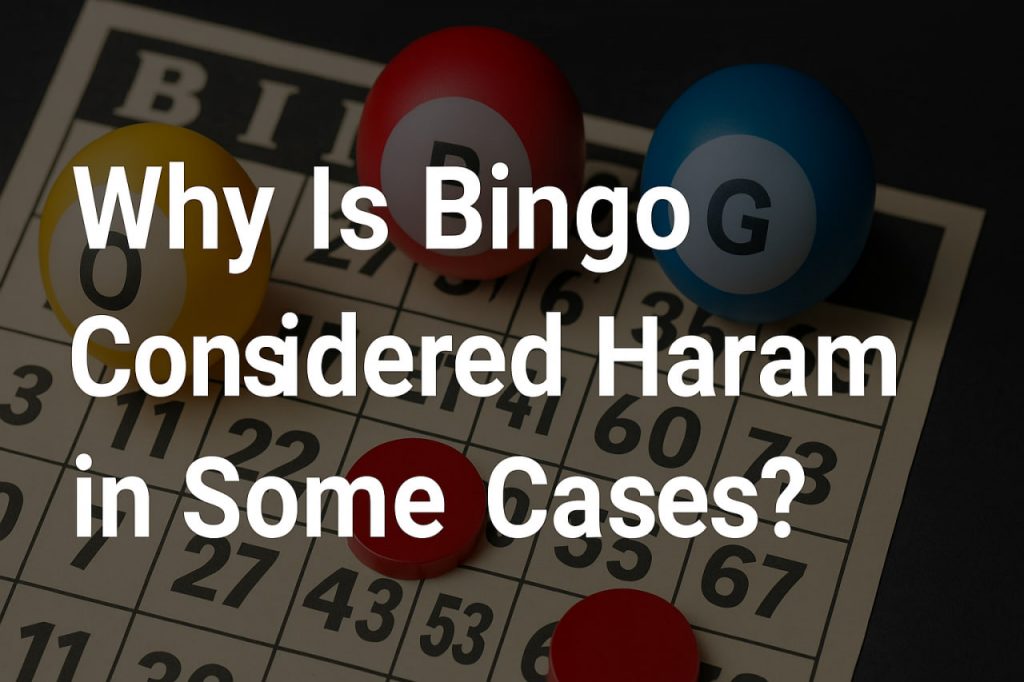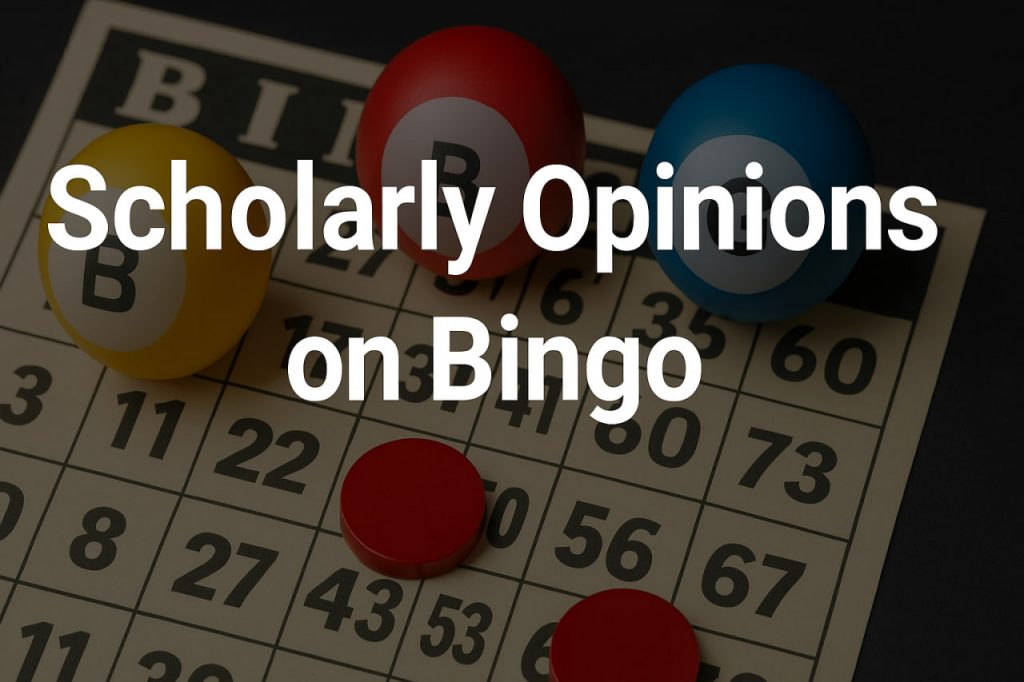Is Bingo Haram or Halal in Islam?

In today’s digital age, the popularity of games like Bingo has exploded. Once confined to community centers and elderly clubs, Bingo is now a global activity, taking place in living rooms, schools, churches, mobile apps, and sophisticated online platforms. It is cherished by people of all ages for its simplicity, excitement, and social bonding potential. But for Muslims striving to live by Islamic values, an important concern arises: Is Bingo haram or halal in Islam? This inquiry isn’t just theoretical; it carries real-world implications for how Muslims engage with entertainment.
As online and mobile gaming becomes more accessible, distinctions between harmless fun and forbidden gambling often blur. With Bingo offering both free and monetary versions, it’s essential for Muslims to know where Islamic law draws the line. This article explores Bingo from various Islamic perspectives, highlighting religious rulings, forms of the game, ethical considerations, scholarly opinions, and more. We aim to offer a clear and practical guide that empowers Muslims to make choices that are not only fun but also faith-affirming.
We’ll also explore how Bingo fits into Islamic ethics, how to evaluate your own gaming habits, and how to use such activities as opportunities for education and connection—without compromising Islamic principles.
Understanding Bingo: What Is It?
Bingo is a game of chance in which players match numbers printed in different arrangements on cards with numbers the game host draws at random. The first player to match a set pattern and call out “Bingo!” wins. While seemingly simple, the variations and contexts in which Bingo is played can make all the difference.
Bingo’s origins can be traced back centuries to lottery-style games in Italy and France, and over time, it evolved into the format we know today. It has become a fixture of social life in many cultures and continues to evolve in modern times.
Common Types of Bingo:
- Traditional Bingo: Typically hosted at community centers, senior halls, or religious events. It may involve token prizes or entry fees.
- Online Bingo: A rapidly growing format where players participate using real money or credits. Online games often include ads, promotions, and paid boosts.
- Charity Bingo: Bingo played to raise funds for nonprofit or humanitarian causes. Despite its good intentions, it often involves entry fees and prize draws.
- Family/Friendly Bingo: Played at home or school, usually for entertainment without any money or betting involved.
- Educational Bingo: Custom-made Bingo cards are used to teach children language, math, Islamic studies, or general knowledge.
- Hybrid Bingo Events: In some cases, events mix elements of fun and fundraising, further complicating the halal/haram distinction.
The diversity of Bingo formats makes it essential to examine each one under the light of Islamic rulings.
Play Halal-Approved Bingo Chosen by Our Team
Many online bingo rooms are based on real-money tickets, prize pools, and pure chance, which makes them haram in Islam. Our team has reviewed different bingo formats and selected a Shariah-verified option that removes the gambling aspect and focuses on safe, halal-friendly entertainment.
This halal bingo experience lets Muslim users enjoy the social and fun side of bingo without staking money or chasing random cash rewards.
- ✔ Bingo format reviewed and Shariah-checked
- ✔ No paid tickets, no betting, no cash jackpots
- ✔ A halal-conscious way to enjoy bingo-style games
Note: This recommendation is based on our team’s Shariah analysis and is provided for educational purposes only. For personal rulings, please consult a qualified Islamic scholar.
Is Bingo Haram or Halal? The Shortest Answer
In Islam, the key factors that determine whether Bingo is haram or halal are the presence of monetary stakes, the involvement of gambling, and the intent behind playing. Let’s break this down:
| Type of Bingo | Involves Money | Gambling Element | Verdict |
|---|---|---|---|
| Gambling Bingo (real money) | ✅ | ✅ | Haram |
| Charity Bingo | ✅ | ✅ | Haram |
| Free Bingo (no money) | ❌ | ❌ | Halal |
| Family/Fun Bingo | ❌ | ❌ | Halal |
| Educational Bingo | ❌ | ❌ | Halal |
| Competitive Prize-Based | ✅ | ✅ | Haram |
Thus, the same game can be halal or haram depending on how and why it is played. The intentions, environment, and outcomes all matter.
Why Is Bingo Considered Haram in Some Cases?

Islam places strong emphasis on fairness, transparency, and ethical living. Anything that promotes greed, deceit, or exploitation is discouraged or outright forbidden. Below are reasons why Bingo is sometimes considered haram:
1. Elements of Gambling (Maisir)
- Any game where participants risk money for a chance to win more is considered gambling.
- Bingo played for cash prizes or where money is staked falls squarely under this definition.
- Qur’an (5:90-91) warns against gambling as a tool of Satan to create hatred and distract from prayer.
2. Uncertainty and Ambiguity (Gharar)
- Bingo relies solely on chance. Players cannot influence outcomes.
- This introduces uncertainty in transactions, which Islam discourages, especially when money is involved.
3. Wasting Time and Mental Energy
- Islam encourages purposeful living. Activities should benefit you spiritually, mentally, or socially.
- Spending excessive hours on Bingo, especially online, can lead to addiction, social withdrawal, or neglect of responsibilities.
4. Promoting False Hopes and Greed
- Games with random rewards often cultivate a “get rich quick” mindset.
- This conflicts with Islamic values of patience, hard work, and reliance on Allah.
5. Ties to Un-Islamic Environments
- Bingo halls often exist alongside other vices like alcohol, smoking, and immodesty.
- Online Bingo may contain suggestive ads, inappropriate avatars, or themes contradicting Islamic modesty.
6. Spiritual Distraction
- Regular engagement in such games can reduce mindfulness, disrupt prayer schedules, and cause dependency on worldly pleasures.
When Is Bingo Halal?
Not all forms of Bingo are haram. When stripped of monetary incentives and played in moderation for educational or social benefits, Bingo can be halal. Here’s how:
✅ No Gambling or Prizes
- No money, no entry fee, no financial risk.
- All participants play just for fun, not for material gain.
✅ Educational Purpose
- Arabic alphabet Bingo, Quranic verse Bingo, or science and math-based Bingo games can help reinforce learning.
- Teachers and parents often find these tools effective and engaging for children.
- Islamic schools may integrate Bingo as a supplementary tool for memorization and vocabulary.
✅ Social or Family Bonding
- Played during Eid, family nights, or at school events without money or competition.
- Creates a warm, relaxed environment conducive to Islamic values.
- It can foster teamwork, healthy interaction, and mental stimulation.
✅ Balanced with Worship and Productivity
- Entertainment should not replace prayer or Qur’an reading.
- Halal games should be played mindfully, not addictively.
- Setting time limits and having spiritual intentions can preserve barakah.
✅ Conducted in Safe and Modest Settings
- Avoid Bingo apps or platforms with chat rooms, avatars, or inappropriate content.
- Favor offline games or trusted educational apps.
- Ensure the game aligns with Islamic etiquette and privacy standards.
Scholarly Opinions on Bingo

Islamic scholars from all four major Sunni schools have addressed the concept of gambling and permissible games. Their stances on Bingo, though not always specific, fall within broader guidelines for games and entertainment:
| Scholar/School of Thought | Gambling Bingo | Educational/Fun Bingo |
| Hanafi | Haram | Halal (if no money) |
| Maliki | Haram | Halal with caution |
| Shafi’i | Haram | Permissible for learning |
| Hanbali | Haram | Allowed in social setting |
| IslamQA / Contemporary Fatwas | Haram | Halal if educational or family-safe |
These views demonstrate a shared concern about the harms of gambling, while also acknowledging that not all games are forbidden. The scholars emphasize intention, context, and content.
Final Thoughts
The question “is Bingo haram or halal” is one many Muslims may ask without realizing the nuances involved. As with most things in Islam, the answer depends heavily on intention, execution, and context. Games, in themselves, are not forbidden—but the environment, purpose, and outcomes they lead to can render them impermissible.
When played with respect to Islamic guidelines, Bingo can be a delightful tool for learning, bonding, and recreation. But when it crosses into the realm of gambling or excess, it becomes spiritually harmful. Muslims must remain mindful, seeking not just fun but benefit and barakah in their activities.
Entertainment is part of a healthy life, but Islam teaches us to be intentional and spiritually aware. By asking yourself key questions about any game—including Bingo—you can enjoy your leisure time without straying from your deen. Always prioritize faith, family, and purpose.
So the next time you’re invited to play Bingo, pause and ask: Is it free? Is it educational? Is it respectful of Islamic principles? If so, you can enjoy it guilt-free. If not, it’s better left alone in favor of something that nourishes your heart and soul.

User Reviews
I used to feel uneasy about playing bingo because of the money and prizes. This site helped me find a Shariah-verified bingo option that is actually halal. Now I can enjoy the game without any guilt.
Your halal bingo recommendation is exactly what I was looking for. The explanation about why normal bingo can be haram was very clear, and the alternative you suggest feels safe for Muslim players.
As a practicing Muslim, I really appreciate that this site separates gambling-based bingo from a Shariah-checked, halal-friendly version. It helps me have fun while staying within Islamic limits.
Before finding this page, I didn’t know there was any halal way to play bingo. The Shariah-verified option recommended here gives me confidence that I’m not getting involved in gambling. Great work!